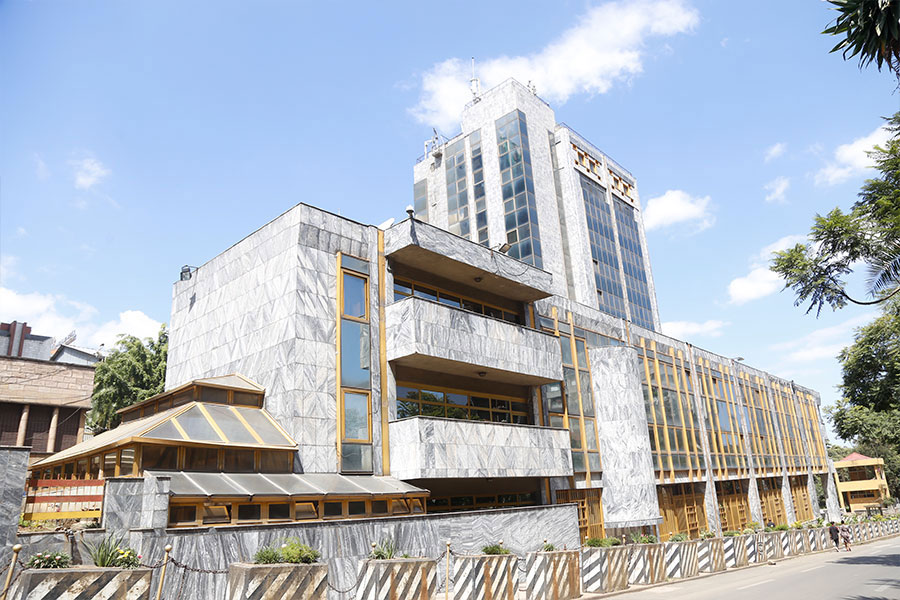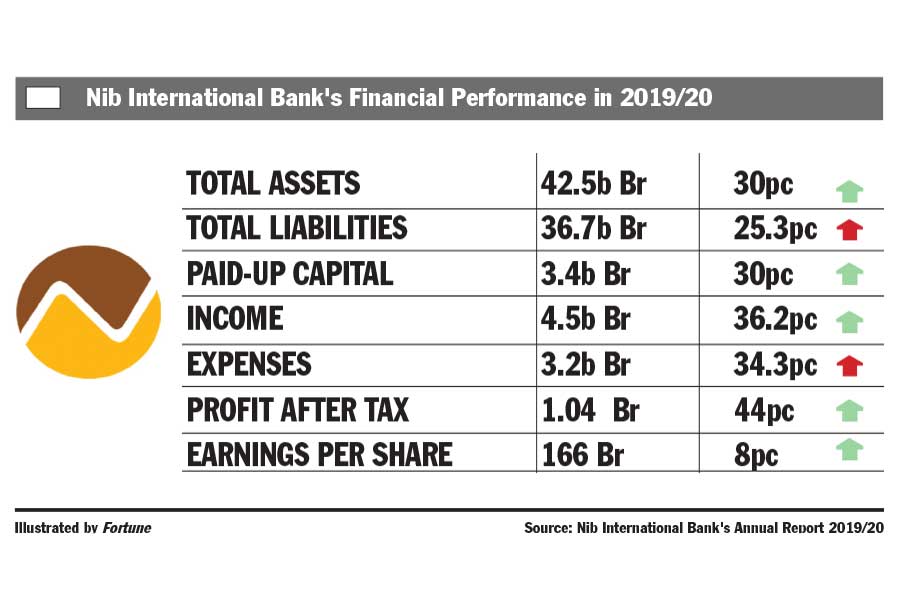
Radar | Jun 11,2022
Aug 21 , 2021.
The signs are there for anyone curious to pay attention to see. And they are ominous.
Debts of domestic and external sources besiege Ethiopia's economy, the currency is falling, the exchange rate in volatility, the middle class (whatever small there is) losing the battle against inflation, and the lower-income group marching into impoverishment. These are recipes for social and political implosions. Ironically, the storms have been gathering for some time, only exacerbating with the onset of the ongoing civil war.
Policymakers on the macroeconomic front were supposed to be ahead of the curve in navigating the economic vessel to a less collision course. They have failed to do so, judging by the measures they take, driven by desperation. The suspension by the central bank of all commercial banks to freeze asset-based collateralised lending is one major illustration of such a knee-jerk approach to inherently structural problems.
Granted, central banks are not known for being forthcoming. It has to do with the nature of their purpose. Ideally, every decision they make and the direction they take is analysed, debated and speculated over. Predicating a central bank’s next move could be the difference between making a fortune overnight or losing it. Think of speculators that unload all of their local currency assets a day before it is devalued versus investors that brought that currency simultaneously.
Something of this version may have been happening in Ethiopia’s economy. Those whose wealth is denominated in Birr are closely monitoring events. Understandably, the war in the northern part of the country is high on their minds, political instability, debt-restructuring, run on forex, galloping inflation, and the COVID-19 pandemic.
Some of them are betting against the Birr, or even Ethiopia's economy, whether or not they know it. Take, for instance, the escalating lease price of land. It is entering a bubble in Addis Abeba as individuals with significant savings scramble to convert the Birr into non-liquid assets, deemed a better store of value for their wealth. The stubbornly large gap between the Birr's official and exchange rates in the parallel market is another example, especially for those who receive remittance and convert the dollars outside banks.
Ordinary people are doing it. A person who earns the same salary as last year makes about a fifth lower when adjusted to inflation. Even the most financially laypersons would have noticed by now that they will never save enough to convert their incomes into assets, such as a house. Worse still, they assume that a certain good or service today would most likely cost more tomorrow; thus, they spend now more than they would otherwise have done. People have no other options but to speculate, and their inflationary expectation further feeds into the rise of prices.
The speculation that grabs the most headline is Ethiopia’s Eurobonds, worth one billion dollars. The premium demanded to hold it is near twice the African average. Most investors shy away due to the bloody war in the north and the expressed interest by Ethiopia for debt-structuring negotiation with creditors. Only that of Zambia’s is worse as the country defaulted on its debts a year ago.
Investors are betting against Ethiopia being able to pay them back when the bond matures in 2024.
Recent trends in the economy that have alarmed Yinager Dessie (PhD), governor of the National Bank of Ethiopia (NBE), could be an obvious uptick in capital flight. The difference between the official and parallel markets in exchange rates has never been reconciled, bleeding the economy of desperately needed foreign currency. But lately, over a span of a few weeks, the dollar was valued at around 70 Br in the parallel market, showing a record gap of 25 Br with the official exchange rate. Indeed, something abnormal was taking place, to which authorities at the central bank blamed ”economic sabotage.”
The central bank`s measures in freezing lending were significant. Primary is how poorly it responded. Any central banker worth its salt would not have stayed passive in the face of a suddenly widened gap between the formal and informal exchange rates. There was bleeding that needed to be stopped lest it takes the rest of the economy down with it.
It ought to be alarming that the central bank did not have contingency plans in such a case, given that the country had been at war since November last year. It could be considered less than a miracle that the exchange market lasted as long as it did before a panic-induced attempt to fly capital out of the country occurred. It speaks volumes on how hard it is to liquidate assets in Ethiopia. Nonetheless, it was an ill-advised measure. Using blunt force against the few speculators or those that engage in alleged ”economic sabotage” harms the majority that sustains Ethiopia’s economy, especially if the freeze on loans lasts a long time.
No less astounding was how this was communicated to the executives of the commercial banks who were told to freeze lendings through text messages. The central bank has rarely been accused of being too transparent, but a decision of this magnitude would have required a more comprehensive engagement with the industry and the public. It was uncalled for in act and unbecoming central bankers in not reassuring the market not to panic. It is a temporary measure until the economy's bleeding is patched up to more tolerable levels.
Central bank`s passivity and untransparent manner of business should come as no surprise. The country has had a free-falling currency virtually over the past three years as Prime Minister Abiy Ahmed's (PhD) administration let the Birr depreciate father than the trend in the previous two decades. Not unexpectedly, this has been converted into an inflationary pressure that is wiping out savings and wages. The central bank has been largely silent and has not taken any significant measures to deal with it.
However, blame for Ethiopia’s economic woes as it manifests itself in the loss of trust for the Birr cannot be laid solely at the feet of the central bank. The country is going through an enveloping civil war for the first time in nearly three decades. The worst economic recession in the world since the Great Depression was precipitated by the COVID-19 pandemic.
Neither is the central bank doing a terrible job navigating through economic transformation to open up the economy. It is not loaning to the central government as much as it used to, has allowed non-financial institutions to engage in mobile payment, started a commendable effort to address the overvaluation of the Birr and has lifted entry obstacles to banking (leading to over a dozen under-formation banks).
Unfortunately, it has also failed to act as a central bank operating under immense political uncertainty. Things have gone from bad to worse – from political instability to a heartbreakingly brutal civil war with no end in sight. It is not an institution in a country that is not thriving but barely trying to survive. Ethiopia is degenerating from a fragile to a failed state. It is a war-footing economy, and it is time the central bank starts acting that way.
The central bank should prioritise more than opening up the economy, deregulating the financial sector and putting a more flexible exchange rate market in place. That priority is addressing the falling trust in the Birr as a store of value to stave off economic collapse. The key to this is fighting against capital flight and the informalisation of the economy. Both have to do with fending off the strengthening of the exchange rate in the parallel market as individuals and investors scramble to protect against the falling value of the Birr.
As long as Ethiopia’s political situation fails to show any sign of improvement, policymakers have little choice but to consider raising the interest rates on deposits and ease the Birr's depreciation. This would inevitably make the cost of borrowing high, thus deter the market from a lending bubble. It also encourages savers to keep their money with the banks, hoping to gain for their deposits more than what the asset bubble offers them.
A year ago, it would have made sense to maintain lower interest rates on deposits to stimulate spending against business activities affected by the COVID-19 pandemic and gradually depreciate the Birr to address its overvaluation. But these are not normal times. Now, the question is not whether Ethiopia’s economy can grow – as unfortunate as it sounds – but whether it could be saved.
The central bank’s ability to inspire trust in the currency (thus the economy) is no less significant. Investors and savers need to be assured that the institution that controls the value of the Birr is prepared to act when needed to intervene and preserve certainty in the economy. The difference between a piece of paper and Birr in an individuals’ pocket is that the central bank backs the latter as legal tender. When public confidence in the central bank`s ability to flex its control is eroded, the Birr has an inevitable run. This has already begun, and no amount of blame game on alleged forces undermining the economy can save it from further collapse.
PUBLISHED ON
Aug 21,2021 [ VOL
22 , NO
1112]

Radar | Nov 16,2019

Radar | Feb 03,2024

Fortune News | Jan 23,2021

Fortune News | Oct 23,2018

Radar | Jul 02,2022

My Opinion | 131584 Views | Aug 14,2021

My Opinion | 127940 Views | Aug 21,2021

My Opinion | 125915 Views | Sep 10,2021

My Opinion | 123539 Views | Aug 07,2021

Dec 22 , 2024 . By TIZITA SHEWAFERAW
Charged with transforming colossal state-owned enterprises into modern and competitiv...

Aug 18 , 2024 . By AKSAH ITALO
Although predictable Yonas Zerihun's job in the ride-hailing service is not immune to...

Jul 28 , 2024 . By TIZITA SHEWAFERAW
Unhabitual, perhaps too many, Samuel Gebreyohannes, 38, used to occasionally enjoy a couple of beers at breakfast. However, he recently swit...

Jul 13 , 2024 . By AKSAH ITALO
Investors who rely on tractors, trucks, and field vehicles for commuting, transporting commodities, and f...

Jun 29 , 2025
Addis Abeba's first rains have coincided with a sweeping rise in private school tuition, prompting the city's education...

Jun 29 , 2025 . By BEZAWIT HULUAGER
Central Bank Governor Mamo Mihretu claimed a bold reconfiguration of monetary policy...

Jun 29 , 2025 . By BEZAWIT HULUAGER
The federal government is betting on a sweeping overhaul of the driver licensing regi...

Jun 29 , 2025 . By NAHOM AYELE
Gadaa Bank has listed 1.2 million shares on the Ethiopian Securities Exchange (ESX),...